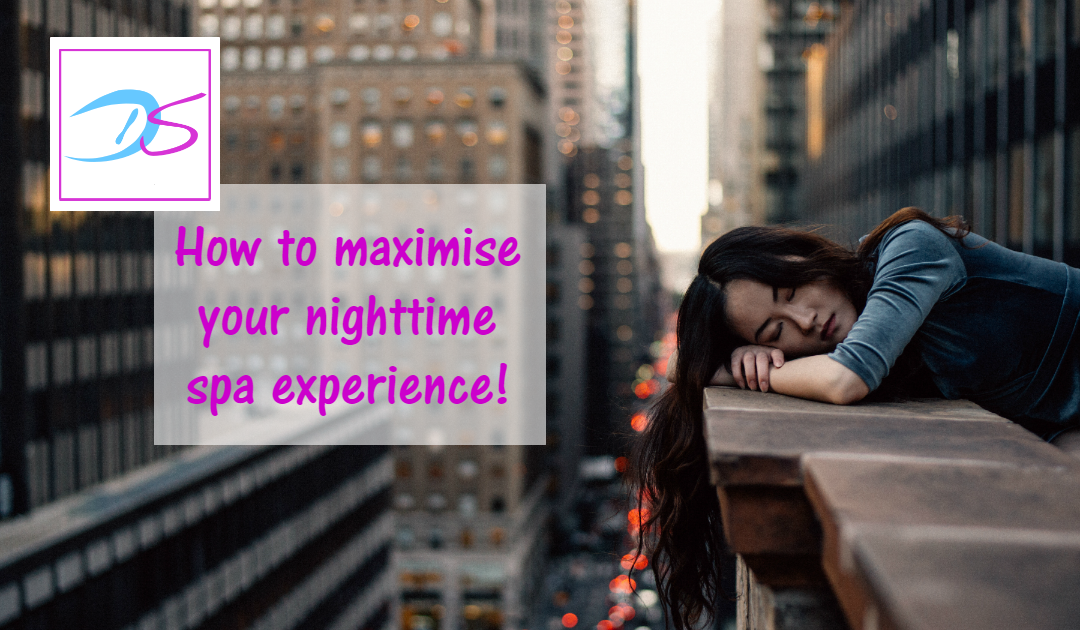Nighttime spa experience, huh? Are you missing your bus or did you miss last week’s post? Either way you best hop over there before continuing here.
How is it going with catching your nighttime spa bus? Has it been arriving at a regular time for you or does it seem to be rather unreliable? Like I pointed out last week, if you have trouble falling asleep or wake up in the middle of the night, it does not mean that you have a faulty spa bus, it’s much more likely that your body is getting the wrong cues form the outside and/or from the inside.
Here is one critical tip for a good nights sleep: Your body needs to be convinced that sleeping really is what you want to do!
Especially if you have trouble falling asleep, are you sure your body is convinced that going to sleep really is what what you intend to do? Let’s take a closer look at why your body may be confused about your intentions.
In order for our body to fall asleep we need a couple of un-negotiable ingredients just like you do for making a cake. If you forget eggs and/or baking powder it will not be the light fluffy cake you intended it to be.
The eggs and baking powder for sleep are
- a peaceful mind (no stress)
- darkness
Both of these are critical for the production of melatonin and because it is critical to our sleep it’s also called the sleep hormone or the darkness hormone. It is produced by the pineal gland which sits behind the spot that you may know as the ‘third eye’. During daylight melatonin levels are low and they peak during the dark. Melatonin production also requires our stress hormone, cortisol to drop, hence darkness and a peaceful mind are critical for sound sleep.
Here are some other factors that can impact sleep quality
- noise (too little or too much)
- temperature (too low or too high)
- light exposure, especially full spectrum light, in the 1 – 2 hours before bed time
- digestive activity (especially for people with light, restless sleep)
Are some light bulbs going off how your evening choices may confuse your body about whether sleep is what you are really after?
Spending time on screens (smart phone, tablet, PC or TV) in the 1 – 2 hours before bedtime can be particularly confusing to the brain. Screens emit full spectrum light telling the brain it’s day time. Too much light in the bedroom can therefore also be the wrong signal. How about choosing activities like paying the bills, finishing up some work that did not get done in the office, watching exciting movies or having stressful conversations? These types of activities are likely to amp up your brain rather than getting you into a peaceful state of mind. When you feel too cold or to warm, your body may not be able to relax either, the same goes for too much or too little noise.
Now let’s close the loop: do you want to feel vibrant, energized and keep your body systems balanced and in good shape for the long run? Then here are my top tuning for your optimal spa experience
- Chose calming evening activities that help you to relax (nothing that could amp up your brain and raise your cortisol levels). Going for a stroll, reading a book, playing with a pet or folding laundry are some ideas.
- Turn off all full-spectrum lights (all screens) for 1 – 2 hours before bedtime. You may also want to start dimming other lights that surround you.
- Make it quiet. If you cannot eliminate noise, try foam ear plugs and if you feel it’s too quiet try white noise from a fan or air cleaner (which can have tremendous other health benefits).
- Be mindful of the temperature, any extremes naturally increase stress hormones. Think about the thickness of your duvet. If you have cold feet you may want to put on socks or adjust the heating.
- Introduce a relaxing ritual at night to create a consistent signal for your body that it’s time to go to sleep. A calming herbal tea (e.g. lavender, chamomile, valerian, passionflower) or a hot bath with Epsom salts may work well. Reading an inspirational book or taking 5 to 10 minutes for gratitude journaling.
- Quiet your digestion. If you have light or restless sleep this may be a very powerful game changer. I recommend no food at all a full three hours before bed.
Give it a go and let me know what how any changes you choose impact your sleep. If none of this is helping or you don’t get the sleep improvement you are looking for, you may have something going on in your gut. In order for our body to produce melatonin, we need serotonin, our feel good neurotransmitter, and about 90% of it is made in the gut. There can be a wide variety of reasons for gut issues which would need further investigation.
If you know anyone who has sleep issues or seems tired too you, please do share this post.


